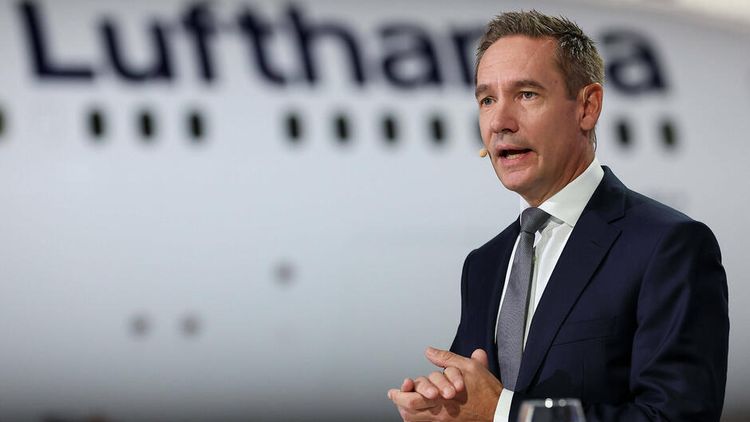Insights on Lufthansa's New Cabin Product and Operational Challenges from CEO Conversation

Insights on Lufthansa's New Cabin Product and Operational Challenges from the CEO
Sam Chui and I recently visited Berlin where Lufthansa Airlines unveiled their latest onboard products. It was interesting to have a conversation with Jens Ritter, the CEO of Lufthansa Airlines, during our visit. Lufthansa Group has planned to invest 2.5 billion euros in enhancing their products and services by 2025.
A: What is the carrier's strategy to handle the extended period of moving from the current products to the new ones, which are typically a few years away?
Jens Ritter, in a product launch event in Berlin, announced that Lufthansa and SWISS aim to install either "Allegris" or "SWISS Senses" on 80 percent of their long-haul planes by 2027 or earlier.
In the next few years, certain sub-groups within the company will phase out their older airplane models. Specifically, the four-engine Boeing 747-400s, Airbus A340-600s, and Airbus A340-300s will be retired while the twin-engine Boeing 777-200s, Boeing 767-300s (which are used by Austrian Airlines), and Airbus A330-200s will continue to be used.
A: However, with regards to the fresh in-flight goods, there are going to be seven distinct Business Class alternatives. Would it not become excessively challenging in relation to the price system?
The CEO stated that currently there are various choices available for travelers such as First, Business, Premium Economy and Economy Class, as well as varying fares and seats with an extended space for legs. However, the company is now introducing additional options for passengers, across all travel classes.
When flying in Business Class, most people tend to reserve a Classic seat, as this option includes all the perks of the updated offering. Those with specific needs or preferences can opt for one of the six other seats that offer further comfort features. As an exciting new addition, travelers can now enjoy the luxury of their very own suite, complete with waist-high walls and sliding doors, providing an even greater level of privacy and comfort. This change is highly anticipated among passengers.
A: Currently, numerous airlines in Europe are planning to expand their wet lease capabilities in order to maintain stability during the summer season. Is Lufthansa addressing this issue as well?
Overall, there are still factors that are restricting progress in various locations. These include issues with personnel, particularly among our partners in the system, difficulties with aircraft delivery, and challenges with obtaining necessary components and replacement parts,” stated Ritter.
Over in Europe and Asia, Lufthansa's offerings measure up to their competitors in terms of both quality and availability. When it comes to flying across the Atlantic, Ritter boasted that Lufthansa actually outranks the rest of the pack due to its strong A++ joint venture. Rather than filling up its planes to the brim, Lufthansa purposefully keeps capacity at 85-90% to prioritize operational consistency, punctuality, and overall excellence. In fact, they make sure to only schedule flights they can confidently manage, meaning they won't add more flights than they can handle. And should they realize that their initial capacity may not suffice, they'll make sure to adjust their plans in plenty of time.
A: The frequent strikes carried out by trade unions in Germany have not only affected Lufthansa but also various transportation systems and airports. In your opinion, to what extent do these strikes have a negative impact on the reputation of the airline or even Germany as a whole?
Ritter expressed his remorse on behalf of the airline's passengers who were affected by the recent public sector employee strike. This strike caused a complete halt in air traffic at various German airports, including Frankfurt and Munich, disrupting the travel plans of tens of thousands of people. He emphasized that this event severely impacted the reputation of aviation in Germany and the nation's image as a prime business location. Despite Lufthansa's lack of involvement in the strike, Ritter stated that they deeply regretted the inconvenience caused to their passengers.
The Lufthansa Group is facing another issue with getting their hands on new airplanes. According to Ritter, "There are difficulties with receiving aircraft deliveries and obtaining the necessary parts all around the world." The good news is that the Lufthansa Group has already taken measures to address this issue.
The group has acquired over 50 new long-distance planes of the latest generation, which includes 22 Airbus A350s and Boeing 787s. The new planes will come equipped with a new type of cabin that features modern seats in all classes. The Lufthansa Group will be receiving a total of 108 new long-distance planes, like the A350-1000, A350-900, Boeing 787-9 and Boeing 777-9, in the upcoming years. This was stated by Ritter.
The featured picture is from handelsblatt.com with IMAGO/HMB-Media.



